Robots Will Do Everything You Do Now Only Better—What
Then?
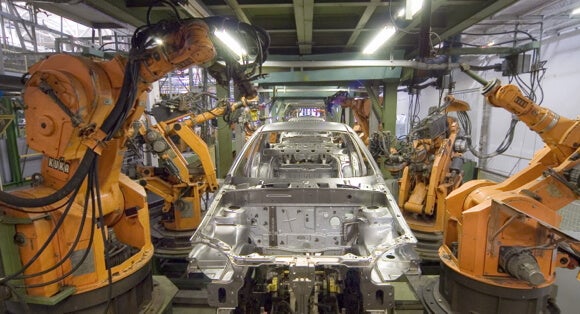
The S&P 500 is at record highs, having finally regained all it lost in the 2008 financial crisis. It would be cause for celebration if it didn’t feel so out of touch with the “main street” reality of continued high unemployment. As a recent New York Times headline read, “recovery in the US is lifting profits, but not adding jobs.”
The NYT goes on to blame the divide between rising corporate profits, recovering stocks, and stubborn unemployment on big gains in productivity over the last few years. The article notes that the giant industrial conglomerate, United Technologies, “does not need as many workers as it once did to churn out higher sales and profits.”
While United Technologies (and other manufacturing firms) may not be adding jobs, it’s strange to blame today’s high rate of unemployment on the trend. Due in large part to automation, manufacturing jobs have been disappearing for over 30 years. During that period, unemployment has been as high as 10.8% and as low as 3.8%. A better headline might read, “recovery in the US is lifting profits, but not adding traditional jobs in manufacturing and that’s nothing new.”
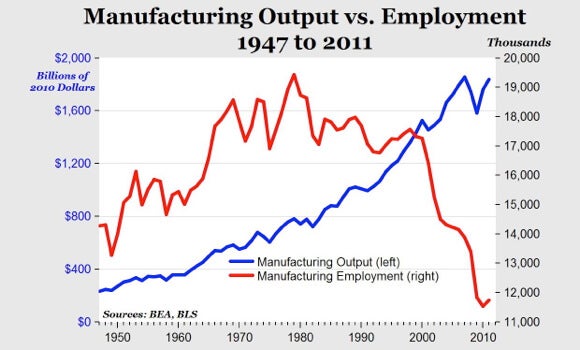
Credit:
MJ Perry, Carpe Diem, BEA, BLS
It’s rarely noted, but even as manufacturing jobs have steadily decreased, total manufacturing output has steadily grown. Since World War II, manufacturing output in the US has risen over 700%. While rising productivity is often demonized as a job killer, in truth, it is a very powerful force for good in the modern economy.
The time and creativity that productivity growth frees—and it’s been happening since the Industrial Revolution—is responsible for every modern invention from healthcare to high tech, smartphones to non-invasive surgery. If humans hadn’t started using machines to do some things for us, most would still be working in the fields with few moments to spare pondering economic theory, let alone inventing new technologies.
One argument says that this time is different because soon robots will be able to do everything a human does. But it’s misguided to assume we can forecast what humans “will do.” What that statement really means is, “In the future, robots will do everything humans do today.” But what exactly it is that humans will do in the future is anyone’s guess—and few, if any, have ever successfully predicted it.
 Before
the 20th century, most folks in the West farmed. Now, thanks to
massive productivity gains in agriculture, virtually none do. To a 19th
century farmer that would imply nothing less than the collapse of the economy.
Why? Because the thing most people did back then was farm. Our farmer might
understandably wonder, “What will we do when machines perform our jobs for us?
How will we make money? How will we survive?”
Before
the 20th century, most folks in the West farmed. Now, thanks to
massive productivity gains in agriculture, virtually none do. To a 19th
century farmer that would imply nothing less than the collapse of the economy.
Why? Because the thing most people did back then was farm. Our farmer might
understandably wonder, “What will we do when machines perform our jobs for us?
How will we make money? How will we survive?”We are gifted with the vision of our times and cursed with the temptation to extrapolate that vision into the future. How could our farmer know that in 2013 humans would be paid to make movies, pick up garbage, write online, build robots, clean bathrooms, engineer rockets, lead guided tours, drive trucks, play in garage bands, brew artisanal beer, or write code?
The revolution in agricultural technology liberated vast resources and made us all richer and the economy more diverse as a result. And while one might think that those riches should have accrued to only those making agricultural tech, thus permanently widening the income gap, no such thing happened in practice. While those making agricultural machinery undoubtedly made some bucks, the next economic waves provided different work and income for many levels of skill and motivation.
This is understandably a firebrand topic right now. If current unemployment marked the beginning of mass technological unemployment, you can be sure mass social unrest would be quick to follow. But we can’t prove it’s structural yet. Unemployment is a typically lagging indicator. (Click ‘show recessions’ here to see how unemployment continues long after recessions end.) In the last sizable downturn in the early 80s, unemployment didn’t drop below 7% for four years after the recession ended. And that preceded two decades of virtually unbroken growth.
We don’t know precisely what the future holds, but we do know that most in the developed world—even the poorest—live longer, healthier lives than they did a century ago. And while the world will never be a perfect place, technology and productivity have freed more minds to ponder, play, and invent today than ever before.
Robots Could Put Humans Out of Work by 2045

Robots began replacing human brawn long ago—now they’re poised to replace human brains. Moshe Vardi, a computer science professor at Rice University, thinks that by 2045 artificially intelligent machines may be capable of “if not any work that humans can do, then, at least, a very significant fraction of the work that humans can do.”
So, he asks, what then will humans do?
In recent writings, Vardi traces the evolution of the idea that artificial intelligence may one day surpass human intelligence, from Turing to Kurzweil, and considers the recent rate of progress. Although early predictions proved too aggressive, in the space of 15 years we’ve gone from Deep Blue beating Kasparov at chess to self-driving cars and Watson beating Jeopardy champs Ken Jennings and Brad Rutter.
Extrapolating into the future, Vardi thinks it’s reasonable to believe intelligent machines may one day replace human workers almost entirely and in the process put millions out of work permanently.
 Once rejected out of hand
as neo-Luddism, technological unemployment is attracting commentary from an
increasingly vocal sect of economists. Highlighted in a recent NYT article and “60 Minutes” segment, Erik
Brynjolfsson and Andrew McAfee of MIT also discuss the impact of
automation on employment in their book, Race
Against the Machine.
Once rejected out of hand
as neo-Luddism, technological unemployment is attracting commentary from an
increasingly vocal sect of economists. Highlighted in a recent NYT article and “60 Minutes” segment, Erik
Brynjolfsson and Andrew McAfee of MIT also discuss the impact of
automation on employment in their book, Race
Against the Machine.The idea is we may be approaching a kind of economic singularity, after which the labor market as we know it will cease to exist.
The theory is tempting for its simplicity but hard to prove. In my opinion, though you can list anecdotes and interpret select statistics showing the negative effects of automation—the qualitative historical record, that the labor market will evolve and adapt, remains the weightier body of evidence.
Relying on modern statistics to prove something fundamental has changed is troublesome because you can’t do rigorous, apples-to-apples comparisons with most of the technological revolutions of the past centuries. The data get dodgier and the statistical methodologies change the farther back you go.
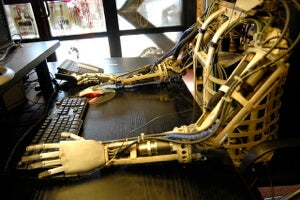 Are
machines really replacing humans faster now than say in the early 19th or 20th
centuries? And are workers really falling behind at a greater rate?
We can’t say with certainty.
Are
machines really replacing humans faster now than say in the early 19th or 20th
centuries? And are workers really falling behind at a greater rate?
We can’t say with certainty.However, we can say that accelerating technology over the last few centuries has consistently erased some jobs only to replace them with other jobs. In the short and medium term, these transition periods have caused discomfort and vicious battles in the political arena. But the long-term outcome has been largely positive—that is, improving living standards thanks to cheaper, better goods and services.
By dismissing qualitative historical evidence as newly irrelevant, you’re left with a quantitative vacuum into which you can inject any number of competing theories, fascinating but as yet impossible to prove or disprove.
As you may have gathered, I fall into the boring mainstream on the subject. To me, the technological unemployment thesis is too dire and what humans will do too hard to imagine. But just because we can’t imagine something, doesn’t mean it won’t exist.
While microchips are just now beginning to replace human brains, machines have been replacing human brawn for years. And yet workers are still paid to perform many physical jobs that were automated long ago and a number of new ones to boot. Why is that?
Assembly line products are cheaper, but folks still place a premium on and desire “handmade” items. Some people feel good about supporting an artisan; others believe the products are better quality; many value something’s distinctiveness, looking down their nose at assembly line monotony. None of these reasons are perfectly rational, but the economy is seldom rational on the level of the individual.
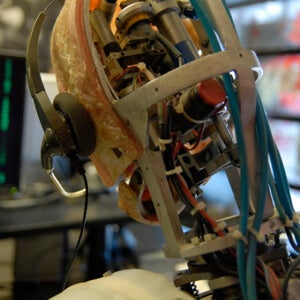 Further,
physical activities that used to be classified as leisure activities now
command an income. In the past, sports were at most an amateur activity for
those who could afford the time to play them. However, in the 19th and 20th
centuries, as countries industrialized, a giant new market in athletics popped
into existence.
Further,
physical activities that used to be classified as leisure activities now
command an income. In the past, sports were at most an amateur activity for
those who could afford the time to play them. However, in the 19th and 20th
centuries, as countries industrialized, a giant new market in athletics popped
into existence.I imagine a futurist at the beginning of the Industrial Revolution finding the idea preposterous. But today’s best pro athletes collect paychecks that would make an investment banker blush. And it’s not just the top athletes getting paid. There are lower tiers for the less skilled too—utility players, backups, smaller market pro leagues, or feeder leagues all pay modest but livable incomes.
Why shouldn’t the same hold true for activities of the mind?
Perhaps in the future, while some of us work hard to build and program super-intelligent machines, others will work hard to entertain, theorize, philosophize, and make uniquely human creative works, maybe even pair with machines to accomplish these things. These may seem like niche careers for the few and talented. But at the beginning of the Industrial Revolution, jobs of the mind in general were niche careers.
Now, as some jobs of the mind are automated, more people are doing creative work of some kind. In the past, not many writers earned a living just writing. But the Internet’s open infrastructure and voracious appetite for content allows writers of all different levels of skill to earn income. The same holds true for publishing—50 Shades of Grey isn’t exactly literature, but it’s sold millions—and music, film, design, you name it.
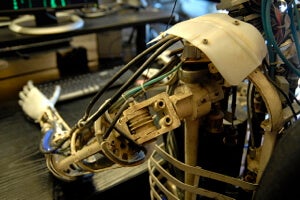 How
will the economy make the transition? The same way it has for the last several
hundred years—with a few (or more than a few) bumps. But maybe these
job-stealing exponential technologies are also empowering humans with
exponential adaptation.
How
will the economy make the transition? The same way it has for the last several
hundred years—with a few (or more than a few) bumps. But maybe these
job-stealing exponential technologies are also empowering humans with
exponential adaptation.Online courses from Coursera and edX and Udacity make education more specialized, shorter in duration, and either cheap or free. This model may allow for faster more affordable acquisition of new skills and smoother economic adaptation. The belief many people are only capable of unskilled labor is elitist to the extreme. The problem of acquiring new skills is largely one of access not intelligence.
There are those who think our great grandchildren simply won’t work. But I can’t imagine such a future. The developed world could have rested on its laurels years ago, having automated the means of production for essentials like food or clothing or cars or televisions (the essentials change as they get cheaper).
But we’re working harder than ever. Why? Work lends meaning to life and leisure. When one kind of work goes away, we tend to create something productive to replace it. And life is richer when we get to trade the fruit of our labors for the vegetables or lines of code or smartphones of other people’s labors.
Vardi says, “The world in 50 years…either will be a utopia or a dystopia.” But history is littered with dystopic and utopian visions, even as the world has consistently muddled along the middle path.
Image Credits: Mixabest/Wikimedia Commons (banner), photologue_np/Flickr (featured, body)
Max Kiesler/Flickr, Thierry Ehrmann/Flickr
Martin Ford Asks: Will Automation Lead to Economic Collapse?
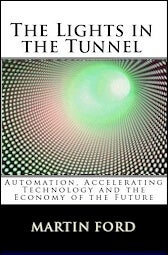
Martin Ford's new book asks how automation will affect the near future
of the economy.
Will the future be filled with cool technologies and endless opportunities or will our own creations lead to eventual doom? I tend to think the former. Technology has seemingly endless ability to improve the health, freedom, and happiness of our lives. Even optimistic futurists like Ray Kurzweil and James Canton admit, however, that the road to advancing technology is fraught with dangers. Super viruses, artificial intelligences run amok, environmental calamity – science has its threats as well as its promises. Yet there could be one near term problem that even futurists tend to ignore – economic collapse. Martin Ford, a silicon valley computer engineer, entrepreneur, and blogger has written The Lights In The Tunnel, a book which explores the economic implications of a world which is becoming increasingly automated.
Ford proposes that in the upcoming years robots and computer programs will edge human workers out of their jobs and that unless we take drastic actions this will reduce mass market purchasing power, destroy consumer confidence, and shut down the global economy. Ford has the reader envision these changes during a thought experiment where lights in a tunnel represent purchasing power in the mass market (hence the title). Even after discussing the book with the author, I’m not convinced that The Lights In The Tunnel is an accurate prediction of our future, but I wanted to spread the question: what does increased automation mean for our economy?
It’s hard to deny that robots and computers will eventually take over for humans in many industries. Already we’ve seen how robots like the Flexpicker and Adept Quattro excel at sorting and moving goods in a manufacturing environment. More humanoid creations, like Kawada’s Nextage or Honda’s ASIMO, could take on even more human-like tasks. And then there are the software programs. We’ve recently showcased how sports journalists and other news people could one day face serious competition from virtual writers and performers. Everywhere, automation is progressing and taking over more jobs. Even vending machines are starting to eliminate the needs for some human workers.
Is the
Fallacy Itself a Fallacy?
Yet even as technology removes some jobs, it creates others. For every worker taken off the assembly line there’s another added to the maintenance team, or two who become consultants. We’ll never automate away all the jobs, will we? Depends on how advanced the machines become.
Back in the industrial revolution, a group of English textile workers protested the use of mechanized looms. These were the Luddites, who believed that jobs lost to machines would lead to economic ruin. Obviously they were wrong. From these protesters modern economists have derisively coined the Luddite Fallacy – the belief that labor saving technologies will increase unemployment. That fallacy is one of the key issues debated in The Lights In The Tunnel (here after TLITT).
In TLITT, Ford argues that the Luddite Fallacy will only remain a fallacy so long as human capability exceeds technological capability. That is, as long as humans are able to improve faster (or as fast as) machines, humans cannot be fully replaced. Ford worries that we’re approaching a point where machines will exceed human performance to such a degree that the Luddite Fallacy will fall apart. Once a superior automated workforce is created, it could take over a large portion of the jobs in our global market.
Much to Ford’s credit, he considers the implications of technology far beyond the loss of manufacturing jobs. TLITT emphasizes that many high paying positions (research lawyers, software engineers, radiologists, etc) could be automated before more mundane ones (mechanic, housekeeper). Specialized fields with algorithmic approaches to problems can be synthesized. Already, the US and many European countries outsource tech support and similar positions to India. Eventually, Ford argues, they’ll be outsourcing positions to computers.
TLITT goes on to predict some pretty awful results from this widespread automation. With few high paying jobs, there will be less people able to buy goods. Sure, a few robotics corporations and software companies will create a new generation of trillionaires, but the number of consumers with middle class purchasing power will diminish. People will sense that purchasing power is dropping and consumer confidence will also decrease. Eventually all the wealth will be consolidated in a relative few, but with no one to sell to, those wealthy will struggle as the economy continues to wither.
Critiques
While Ford proposes a good thought experiment, and pulls no punches as he explores all of its implications, I don’t think his assumptions can go unchallenged. First, there are jobs that may never be automated, or even if they could be, consumers will want humans in those positions. Artists, counselors, public officials, entertainers, teachers, and others provide a “human touch” in their work that is unlikely to be achievable by any but the most impressive of artificial intelligences. If such AI comes to exist, the economy may be the least of our concerns.
Second, we may simply transition away from production and service jobs. Just as the bulk of our workforce has shifted from hunting/gathering to farming to crafts to manufacturing to service, it could continue on to entrepreneurship. Owning capital, and developing it, could be the job of the future. Already we’ve seen how open source projects can help you become a mini manufacturing, information, software or robotics mogul. These trends could continue and define the future economy. Or, even if they don’t, we could all heavily invest in public robotics (and software) companies, thus owning the capital of those firms and spreading the wealth.
Finally, while Ford’s “lights in the tunnel” thought experiment is logically sound, it doesn’t come with a lot of numerical evidence. TLITT includes a reasonably enlightening discussion on the slave economy of the Confederacy during the US Civil War, but otherwise dodges finding historic proof for its assumptions. To some degree I understand: the looming global automation would be unprecedented. Still, I feel like the predictions that Ford asserts should come with some sort of hard evidence.
The author was gracious enough to correspond with me and address my concerns. (He was also patient enough to help me understand the important distinction between industrial and end-user consumption.) Ford’s responds to my first critique by pointing out the sheer number of jobs that could be replaced by automation. He has a table on page 59 of his book that describes the largest occupations in the US. The top positions (sales people, cashiers, office clerks, and food preparers) represent millions of workers, none of whom need a college education. The list goes on to describe other positions which could all be automated. Ford asks, can we really expect all of these people to become artists, and performers, and counselors and teachers? Would most people in these new positions get paid enough to support themselves?
As for the rise of a new capitalist society full of entrepreneurs, Ford’s already had that debate before. He and Robin Hanson (a blogging economist) have discussed that very idea (and other ideas presented in TLITT) in various posts on their respective blogs. Can we all own enough shares of a (robotics) company to replace a general lack of employment income? Hanson implies yes while Ford worries the answer is no. You can catch Ford’s first critique of one of Hanson’s academic papers here, Hanson’s response to that critique here, and Ford’s retort here. It’s hard to summarize the eventual tone of the debate, but I think it boils down to: technophiles don’t adequately understand the market (Hanson) vs. automation will cause disruptions that the market may be unable to compensate for (Ford).
The Cure (and
other fantasies)
Ford doesn’t leave his readers with just another doomsday scenario, he does his best to find a solution. No, he doesn’t think we should (or perhaps even can) avoid automation. Instead, TLITT explores some pretty radical ways that we could put purchasing power back in the hands of the masses and create non-traditional jobs with economic incentives. He speaks of ‘recapturing wages’ by imposing capital/labor taxes on industries as they automate, and value added taxes to goods as they become cheaper. These taxes should not be large enough to discourage automation, but they could (Ford proposes) provide revenue for a new kind of job.
Ford’s ‘virtual jobs’ are incentivised programs that would reward people for pursuits such as education, civic service, journalism, and environmental responsibility. These jobs would be paid for by the state through the revenue gained through recaptured wages. Those who accomplished more in their virtual jobs would receive higher wages, thus providing the financial incentive that everyone needs to feel like they are really working. There would be some industries and some workers that exist outside of this new system, and plenty of space and encouragement (Ford says) for entrepreneurs, who would still have the most potential for monetary gain.
So, to paraphrase Ford’s solution in my own words: we should take money from automating industries to fund a state guided program that gives money to consumers in exchange for working at bettering themselves. Sounds like a decent plan. Never gonna happen.
The US is freaking out simply at the mention of socialized healthcare, socialized work would be dead on arrival. Maybe when 75% of all jobs are automated (the level supposed in TLITT), the governments of the world will see the benefits of such a system, but even then I doubt it. Ford’s solution requires that the wealthy consent to (or that the public impose) increased taxes to avoid economic ruin. I think that those institutions (or people) in the business of acquiring wealth would sooner face ruin than impediments to their financial gain. Even if everyone wanted to switch to such a system, the scope of the change is monstrous.
But then again, so were the changes brought on by the Agricultural and Industrial Revolutions.
For all my critiques of TLITT, I find myself unable to completely argue it away. Automation is increasing, and the economic fall out from that change could be disastrous. Or it could usher in a utopia. We don’t know, and not knowing could prove to be fatal.
After talking with Martin Ford, I’m most impressed with one aspect of his book: it asks a question few seem willing to contemplate. Even if there always are enough jobs for humans, even if a superior automated workforce doesn’t cause economic disruptions, I still think discussing and debating the possibility is an important task. I encourage you to pick up a copy of The Lights In The Tunnel and consider the scenario it warns against. Then add some comments below to get the discussion going. In order to reap the benefits of technology we have to stand ready against the possible threats that it presents, whether or not they ever arise.
Image Credits: Mixabest/Wikimedia Commons (banner), photologue_np/Flickr (featured, body)
Max Kiesler/Flickr, Thierry Ehrmann/Flickr
From Singularity Hub @ http://singularityhub.com/2013/04/28/robots-will-do-everything-you-do-now-only-better-what-then/ and http://singularityhub.com/2013/05/15/moshe-vardi-robots-could-put-humans-out-of-work-by-2045/ and http://singularityhub.com/2009/12/15/martin-ford-asks-will-automation-lead-to-economic-collapse/
For more information about automation see http://nexusilluminati.blogspot.com/search/label/automation
- See ‘Older Posts’ at the end of each section
YOU can help this unique
independent website’s author survive in a small cabin in a remote rainforest
Donate any amount and receive at least one New Illuminati eBook!
Please press the
button -
For further enlightening
information enter a word or phrase into the random synchronistic search box @ http://nexusilluminati.blogspot.com
And see
New Illuminati – http://nexusilluminati.blogspot.com
New Illuminati on Facebook - https://www.facebook.com/the.new.illuminati
New Illuminati Youtube Channel - http://www.youtube.com/user/newilluminati/feed
The Her(m)etic Hermit - http://hermetic.blog.com
The Prince of Centraxis - http://centraxis.blogspot.com (Be Aware! This link leads to implicate &
xplicit concepts & images!)
DISGRUNTLED SITE ADMINS PLEASE NOTE –
We provide a live link to your original material on your site - which
raises your ranking on search engines and helps spread your info further! This site
is published under Creative Commons Fair Use Copyright (unless an individual article
or other item is declared otherwise by copyright holder) – reproduction for non-profit
use is permitted & encouraged, if you give attribution to the work &
author - and please include a (preferably active) link to the original (along
with this or a similar notice).
Feel free
to make non-commercial hard (printed) or software copies or mirror sites - you
never know how long something will stay glued to the web – but remember
attribution! If you like what you see, please send a donation (no amount is too
small or too large) or leave a comment – and thanks for reading this far…
Live long
and prosper!
From the New
Illuminati – http://nexusilluminati.blogspot.com
The real unemployment numbers... Well, imagine this, out of the entire population we can say that roughly 50% of the population is either too young , too old, or too disabled to work. That leaves another 45% of the remaining jobs which are nothing more than paper pushing jobs, like accounting work, politics, banking, clerical, etc... these jobs have nothing to do with the actual hands on mechanical skills to produce and distribute all that we're able to consume. Yes, most every job related to the production and distribution process of ALL the stuff we need to survive can and will be automated leaving only around 5% of all man hours left, so how will we keep the price system economy growing under such realistic conditions? Well, you create more needless wasteful jobs, and you place people who don't work on the doll and give them just enough money so they can continue to buy more light bulbs and toilet paper whist figuring out new ways to waste our resources and depopulate the earth.. This is the plan of the price system economy, do foolish things to entertain us with BS... The real economy on the other hand will be based on the science of production-distribution and consumption in the most energy efficient ways possible whist fully utilizing FREE ENERGY SYSTEMS for the benefit to ALL without any form of political- price system interference.
ReplyDeleteOr you could accept that there are less jobs than people and act on that instead of going all crazy.
DeleteJust let them work for social jobs.
Do more with social wellfare.
Do wealth redistribution.
Incentivises growing the pie instead of taking bigger bites out of it.
"Assembly line products are cheaper, but folks still place a premium on and desire “handmade” items."
ReplyDeleteNo, most people just don't care and want cheap stuff that works good.
Machines are much better at consistently making goods the same than people.
With current 3D printing the whole personalization process is also automized.
The customer does the changes to the model in a simplified 3D program, then every step can be automated.
The very obvious answer to:
"If the machines do all or work, how are we gonna get paid, survive, eat?"
How about you live off the fruits of the labor of the machines?
Isn't that what we are making them in the first place for?
Let the robots do all the work, and do more wellfare.
Booming economy + between 99% and 100% unemployment + everybody happy.
The believe that having to make personalized products in the classical sense is elitist.
We are not working harder than ever because work lends meaning to life and leisure.
But to provide an income because companies are trying to milk people out.
And here is another one:
"For every worker taken off the assembly line there’s another added to the maintenance team,
or two who become consultants. We’ll never automate away all the jobs, will we?"
No, not completelly, just politicians.
Jobs are being automated away and we will EVENTUALLY automate most, almost all jobs.
The industrial revolution also was a time with robber barons and factory owners that exploited their workers in gruesome conditions.
Lots of poor people.
Another fallacy: "That is, as long as humans are able to improve faster (or as fast as) machines, humans cannot be fully replaced."
We haven't actually improved anything substantial. We just do other things that machines can't do.
Simple repetitive motions are much easier to automate than creative and or engineering, technical work.
"Eventually all the wealth will be consolidated in a relative few, but with no one to sell to, those wealthy will struggle as the economy continues to wither."
Some wealthy people and non-wealthy people already know that doing more with social wellfare and adding some wealth redistribution is the way to go.
The solution is hereby already known: more wellfare and wealth redistribution.
One of the jobs you say that will never go away is teachers.
Maybe for reading, writing and a bunch of other things. Lots of things you just need good material.
Ford's 'virtual jobs' thing reminds me off the 3hour a day social service in the Ummite life(Ummites are aliens, have advanced UTOPIAN civilization, have material wealth without jobs)
"So, to paraphrase Ford’s solution in my own words: we should take money from automating industries to fund a state guided program that gives money to consumers in exchange for working at bettering themselves. Sounds like a decent plan. Never gonna happen."
And you need to go further. You need to take money from industries (and print some to add wealth) to fund a state guided program that gives money to consumers in exchange for being able to buy stuff.
Macroeconomy dictates there must be cycles. Companies are product sources and money, wealth sinks and consumers are product sinks and money, wealth sources.
"Ford’s solution requires that the wealthy consent to (or that the public impose) increased taxes to avoid economic ruin.
I think that those institutions (or people) in the business of acquiring wealth would sooner face ruin than impediments to their financial gain."
A similar thing happened in the industrial revolution.
It's time to let go of the ancient and barbaric idea that everyone has to work.
Wholehearted agreement! See Guaranteed Wage: http://nexusilluminati.blogspot.com/search/label/guaranteed%20wage
Delete
ReplyDeleteJoin illuminati order online today, to meet your demand and acquire wealth, power,protection and influence etc. Also get instant sum of 300,000 dollars with a free home anywhere you choose to live in the world, 50,000 dollars monthly as a salary, if you are interested contact us now via email: illuminatiorder.co@gmail.com or call +2348137838605 for assistance.
Join the illuminati today and put your troubles behind you, the illuminati here to give wealth, power and firm, you out there that is tired of your recent situation all hope are not lost yet with the help of illuminati you can still smile again, i must let you know that the illuminat has transform millions of lives overnight and today they are living in endless wealth you can still be part of this wealth no matter your situation. If interested contact us on illuminatechurch190.org@gmail.com and add us on watsapp +2348173859163
ReplyDelete